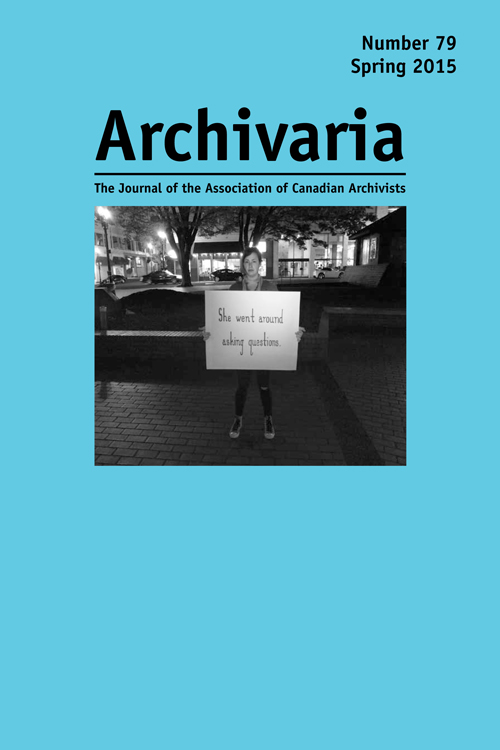Deseronto Dreams: Archives, Social Networking Services, and Place
Résumé
The vision in Deseronto, Ontario, is that the town’s Archives should be like its water tower: a reliable, essential, and conspicuous part of the community it serves, delivering its contents whenever they are needed, with the minimum of effort on the part of the end user. Since 2007, the Deseronto Archives has taken advantage of a number of social networking services (SNS) to make its records available to a wider audience for more than the one day per week that its reading room is open. By posting digitized records and news items to SNS, Deseronto Archives has built an online following of current and former Deserontonians and others who have taken an interest in this small town’s history. This success goes some way to demonstrating the continuing relevance of local identities – of “place” – on the Internet and the hybrid online/offline nature of contemporary culture. In particular, the authors consider how SNS allow the formation of “weak ties” between Deseronto Archives and its online users. These weak ties benefit users in creating their online identities and benefit the Deseronto Archives in demonstrating institutional relevance and allowing it to expand its base of users and supporters beyond those willing and able to visit the reading room during its six open hours per week.
RÉSUMÉ
La ville de Deseronto, en Ontario, estime que son centre d’archives devrait être à l’image de son château d’eau : une partie fiable, essentielle et visible de la communauté qu’il dessert, livrant son contenu au moment où il est demandé, avec le moins d’effort requis de la part de ses utilisateurs. Depuis 2007, les Deseronto Archives ont profité de services de réseautage social (SRS) afin de rendre accessibles leurs documents d’archives à un plus grand public que ne peut le faire leur salle de consultation, qui n’est ouverte qu’une journée sur semaine. En plaçant des documents numérisés et des informations d’actualité sur des SRS, les Deseronto Archives se sont attirées un grand nombre d’adeptes en ligne qui habitent à Deseronto, qui y ont habité, ou qui s’intéressent tout simplement à l’histoire de cette petite ville. Ce succès démontre, dans une certaine mesure, la pertinence continue des identités locales – du « lieu » – sur Internet, et la nature hybride en ligne/hors ligne de la culture contemporaine. En particulier, les auteurs se penchent sur les façons dont les SRS permettent la formation de « liens faibles » entre les Deseronto Archives et leurs utilisateurs en ligne. Ces liens faibles permettent aux utilisateurs de se façonner une identité en ligne, tout en permettant aux Deseronto Archives de démontrer leur pertinence institutionnelle et d’accroître le nombre de leurs utilisateurs et partisans bien au-delà des personnes disposées à visiter la salle de consultation durant les six heures qu’elle est ouverte chaque semaine.
Authors of manuscripts accepted for publication retain copyright in their work. They are required to sign the Agreement on Authors' Rights and Responsibilities that permits Archivaria to publish and disseminate the work in print and electronically. In the same agreement, authors are required to confirm that "the material submitted for publication in Archivaria, both in its paper and electronic versions, including reproductions of other works (e.g. photographs, maps, etc.) does not infringe upon any existing copyright." Authors of manuscripts accepted for publication retain copyright in their work and are able to publish their articles in institutional repositories or elsewhere as long as the piece is posted after its original appearance on archivaria.ca. Any reproduction within one year following the date of this agreement requires the permission of the General Editor.





